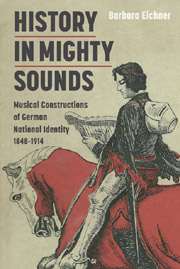Book contents
- Frontmatter
- Contents
- List of Illustrations
- List of Music Examples
- Acknowledgements
- Abbreviations
- Dedication
- Introduction
- 1 The Pure Mirror: National Epic as National Opera
- 2 Germanic Heroes for Modern Germans: Gender and the Nation
- 3 Lost in Transfiguration: Redemption Operas in the Fin de siècle
- 4 The Sacred Nation and the Singing Nation: The Choral Movements
- 5 Symphonic Visions from the Periphery
- Bibliography
- Index
2 - Germanic Heroes for Modern Germans: Gender and the Nation
Published online by Cambridge University Press: 05 February 2013
- Frontmatter
- Contents
- List of Illustrations
- List of Music Examples
- Acknowledgements
- Abbreviations
- Dedication
- Introduction
- 1 The Pure Mirror: National Epic as National Opera
- 2 Germanic Heroes for Modern Germans: Gender and the Nation
- 3 Lost in Transfiguration: Redemption Operas in the Fin de siècle
- 4 The Sacred Nation and the Singing Nation: The Choral Movements
- 5 Symphonic Visions from the Periphery
- Bibliography
- Index
Summary
While Richard Wagner had declared as early as 1851 that historical topics were utterly obsolete for artistic purposes, such operas were still very much alive at the time of the completion and first performance of the Ring cycle. Tannhäuser and Lohengrin, both recognisably set in the medieval period, were just reaching the height of their popularity on German stages in the years of the Reichsgründung, and some of the most successful operas of the 1870s centred on historical subject matter while following the traditional format of grand opéra. Cosima Wagner herself had to admit that the genre continued to have contemporary appeal when she noted in 1879:
In the evening whist and perusal of modern operas, Armin, Folkunger, Königin von Saba; it turns out that the Israelite's work is after all the best, musically more refined; but one cannot take any of these things seriously. The libretto of Armin, with its repulsive and superficial patriotism, aimed merely at effect, is truly horrifying.
Of these three operas, which in the 1870s were amongst the most widely performed and which in the short run were certainly more successful than Wagner's contemporary music dramas, Armin was the only one based on a story from German national history, which explains its obvious patriotism. The story of the Germanic leader Arminius/Hermann was not just one of the many heroic narratives from early German history, but the key to the national imagination.
- Type
- Chapter
- Information
- History in Mighty SoundsMusical Constructions of German National Identity, 1848-1914, pp. 81 - 116Publisher: Boydell & BrewerPrint publication year: 2012

